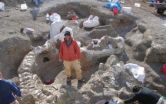(Press-News.org) GAINESVILLE, Fla. — Accidents as minor as a slip of the knife while chopping onions can turn dangerous for patients with hemophilia, who lack the necessary proteins in their blood to stem the flow from a wound.
People with severe hemophilia typically receive regular injections of these proteins, called clotting factors, as a treatment for the disease. But up to 30 percent of people with the most common form, hemophilia A, develop antibodies that attack these lifesaving proteins, making it difficult to prevent or treat excessive bleeding.
Now, researchers from University of Florida Health and the University of Pennsylvania have developed a way to thwart production of these antibodies by using plant cells to teach the immune system to tolerate rather than attack the clotting factors. The study was published today (Sept. 4) in the journal Blood.
"The only current treatments against (antibody) formation cost $1 million and are risky for patients," said Henry Daniell, Ph.D., interim chairman of biochemistry at the University of Pennsylvania School of Dental Medicine and a co-author on the study. "Our technique, which uses plant-based capsules, has the potential to be a cost-effective and safe alternative."
The study focused on hemophilia A, which occurs when babies are born with a defective gene on the X chromosome. Because girls have two X chromosomes — giving them two shots at having a working version of the gene — the disease typically only affects boys. Worldwide, one in 7,500 male babies is born with this disease.
After receiving factor VIII treatments, between 20 and 30 percent of patients develop antibodies against the clotting protein. Instead of allowing the protein to do its job, the immune system responds to this foreign protein as an invader that must be attacked and eliminated.
"In the hemophilia world these antibodies are known as inhibitors," said UF co-author Roland Herzog, Ph.D., a professor of pediatrics in the UF College of Medicine and a member of the UF Genetics Institute. "That is what patients are all scared of, because they render their standard therapy ineffective and inhibit the blood from clotting."
Daniell and colleagues had developed a platform for delivering drugs and biotherapeutics using genetically modified plants to express proteins. After teaming with Herzog and his colleagues at UF, they devised a way to use this technique to stop the body from launching an immune attack on the hemophilia treatment.
Using a combination of factor VIII DNA and another substance that can safely cross the intestinal walls and enter the bloodstream, the researchers fused the genes into tobacco plants. The team fed the resulting plant solution to mice with hemophilia A twice each week for two months and compared them with mice that were fed unmodified plant material. They then gave the mice infusions of factor VIII, just as human hemophilia patients would receive. As expected, the control group formed high levels of inhibitors. In contrast, the mice fed the experimental plant material formed fewer inhibitors — on average, seven times fewer.
"This could potentially be a way to prevent antibodies from forming or lower the incidence of it," Herzog said. "This is a major step forward."
The researchers discovered the mice that ate the experimental plants had more signaling molecules associated with suppressing or regulating immune responses, while mice in the control group had more associated with triggering an immune response.
The researchers also tested whether the plant capsules would help reduce antibodies in mice that had already developed them. After two to three months of feedings with the plant capsules, the mice had three to seven times fewer antibodies than before the treatment began.
"We have been looking for a way to induce immune tolerance in hemophilia for a while," Herzog said. "Oral tolerance is ideal is because you are feeding them something specific that addresses the problem and you don't have to use drugs that suppress the immune system. It's not invasive. You're not manipulating patients' cells. It would be an ideal way to do it."
The treatment would not be a one-time solution, however. Patients would need to continue taking the plant capsules to maintain immune system tolerance. When translated to humans, the researchers will use lettuce plants instead of tobacco plants.
Daniell, Herzog and the Penn Center for Innovation are now working with a pharmaceutical company to test this strategy in other animal species, with plans to begin human trials shortly thereafter. For human use, the goal would be to use lettuce plants instead of tobacco plants.
"With multimillion-dollar funding from a global pharmaceutical company and their decades of expertise in bringing numerous protein therapeutics to the clinic, we're excited to take lettuce capsules producing human blood clotting factors to the clinic soon," Daniell said.
INFORMATION:
The study was supported by the National Institutes of Health and Bayer. Other authors included Jin Su and Shina Lin from the University of Pennsylvania, and Alexandra Sherman and Xiaomei Wang at UF.
Researchers turn to plants to help treat hemophilia
2014-09-04
ELSE PRESS RELEASES FROM THIS DATE:
T. rex times 7: New dinosaur species is discovered in Argentina
2014-09-04
Scientists have discovered and described a new supermassive dinosaur species with the most complete skeleton ever found of its type. At 85 feet long and weighing about 65 tons in life, Dreadnoughtus schrani is the largest land animal for which a body mass can be accurately calculated.
Its skeleton is exceptionally complete, with over 70 percent of the bones, excluding the head, represented. Because all previously discovered super-massive dinosaurs are known only from relatively fragmentary remains, Dreadnoughtus offers an unprecedented window into the anatomy and biomechanics ...
INFORMS study: Customer experience matters more when economy is doing better, not worse
2014-09-04
Customer experience matters more when the economy is doing well than when it is doing poorly, according to a new study in the Articles in Advance section of Marketing Science, a journal of the Institute for Operations Research and the Management Sciences (INFORMS).
The study, entitled "Assessing the Influence of Economic and Customer Experience Factors on Service Purchase Behaviors" is by V Kumar, the Regents' Professor, Nita Umashankar, an assistant professor, and PhD candidates Hannah Kim and Yashoda Bhagwat, all at Robinson College of Business at Georgia State University. ...
The Lancet: International health systems fund could have averted Ebola outbreak
2014-09-04
The Ebola crisis in west Africa could have been averted if governments and health agencies had acted on the recommendations of a 2011 World Health Organisation (WHO) Commission on global health emergencies, according to a new Comment, published in The Lancet.
The Comment, written by Professor Lawrence Gostin, Faculty Director of the O'Neill Institute for National & Global Health Law at Georgetown University, USA, calls for renewed international commitment to a health systems contingency fund to prevent another infectious disease crisis, together with long-term funding ...
2014 Breast Cancer Symposium highlights research advances in prevention, screening, therapy
2014-09-04
ALEXANDRIA, Va. – Five studies from the 2014 Breast Cancer Symposium were highlighted today in an embargoed presscast for reporters. Presentations focused on new studies exploring preventive mastectomy, compliance with recommended screening mammography, and risk of recurrence after pre-surgery therapy for breast cancer. The Symposium will take place September 4-6, 2014, at the San Francisco Marriott Marquis in San Francisco, CA.
Five major studies were highlighted in today's presscast:
Angelina Jolie's Story May Have Helped Double BRCA Testing Rates at a Canadian Cancer ...
Messenger molecules identified as part of arthritis puzzle
2014-09-04
The way in which some cells alter their behaviour at the onset of osteoarthritis has been identified for the first time by researchers at the University of Liverpool.
The study was funded by medical research charity Arthritis Research UK.
The trigger for arthritis is still to be fully defined, but it is known that injuries, obesity or old age can all increase the risk for arthritis, and lead to cells in the affected joint altering their behaviour.
The research team from the University's Institute of Ageing and Chronic Disease has now found that changes in the rate ...
Researcher advances a new model for a cosmological enigma -- dark matter
2014-09-04
LAWRENCE — Astrophysicists believe that about 80 percent of the substance of our universe is made up of mysterious "dark matter" that can't be perceived by human senses or scientific instruments.
"Dark matter has not yet been detected in a lab. We infer about it from astronomical observations," said Mikhail Medvedev, professor of physics and astronomy at the University of Kansas, who has just published breakthrough research on dark matter that merited the cover of Physical Review Letters, the world's most prestigious journal of physics research.
Medvedev proposes a ...
Atomically thin material opens door for integrated nanophotonic circuits
2014-09-04
A new combination of materials can efficiently guide electricity and light along the same tiny wire, a finding that could be a step towards building computer chips capable of transporting digital information at the speed of light.
Reporting today in The Optical Society's (OSA) high-impact journal Optica, optical and material scientists at the University of Rochester and Swiss Federal Institute of Technology in Zurich describe a basic model circuit consisting of a silver nanowire and a single-layer flake of molybendum disulfide (MoS2).
Using a laser to excite electromagnetic ...
Trinity geologists re-write Earth's evolutionary history books
2014-09-04
Geologists from Trinity College Dublin have rewritten the evolutionary history books by finding that oxygen-producing life forms were present on Earth some 3 billion years ago – a full 60 million years earlier than previously thought. These life forms were responsible for adding oxygen (O2) to our atmosphere, which laid the foundations for more complex life to evolve and proliferate.
Working with Professors Joydip Mukhopadhyay and Gautam Ghosh and other colleagues from the Presidency University in Kolkata, India, the geologists found evidence for chemical weathering of ...
Study: Oxidized LDL might actually be 'good guy'
2014-09-04
LEXINGTON, Ky (Sept. 4, 2014) -- A team of investigators at the University of Kentucky has made a thought-provoking discovery about a type of cholesterol previously believed to be a "bad guy" in the development of heart disease and other conditions.
Jason Meyer, a University of Kentucky MD-PhD candidate, worked with Deneys van der Westhuyzen, Ph.D., a Professor in the Departments of Internal Medicine and Molecular and Cellular Biochemistry, to study the role oxidized LDL plays in the development of plaque inside artery walls.
According to Meyer, the medical research ...
Research shows declining levels of acidity in Sierra Nevada lakes
2014-09-04
RIVERSIDE, Calif. — California's water supply depends on a clean snow pack and healthy mountain lakes. The lakes receive a large amount of runoff in the spring from the melting snowpack. If the snowpack is polluted, the lakes will be polluted.
James O. Sickman, an environmental scientist at the University of California, Riverside, has conducted research on lakes in the Sierra Nevada—the most sensitive lakes in the U.S. to acid rain, according to the Environmental Protection Agency—and described human impacts on them during the 20th century. The research was done by ...




